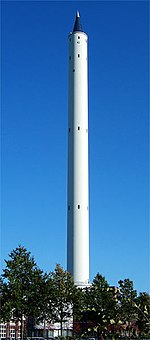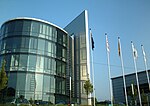Center of Applied Space Technology and Microgravity
German organisation stubsPhysics organization stubsResearch institutes in Germany
The Center of Applied Space Technology and Microgravity (ZARM) is a German scientific institution of University of Bremen involved in research in space technology with applications, among other things, in fundamental physics and gravitation. More than 100 people are employed by the institution.
Excerpt from the Wikipedia article Center of Applied Space Technology and Microgravity (License: CC BY-SA 3.0, Authors).Center of Applied Space Technology and Microgravity
Am Fallturm, Bremen Horn-Lehe (Bremen-Ost)
Geographical coordinates (GPS) Address Website External links Nearby Places Show on map
Geographical coordinates (GPS)
| Latitude | Longitude |
|---|---|
| N 53.1103 ° | E 8.8579 ° |
Address
Zentrum für angewandte Raumfahrttechnologie und Mikrogravitation
Am Fallturm 2
28359 Bremen, Horn-Lehe (Bremen-Ost)
Free Hanseatic City of Bremen, Germany
Open on Google Maps









